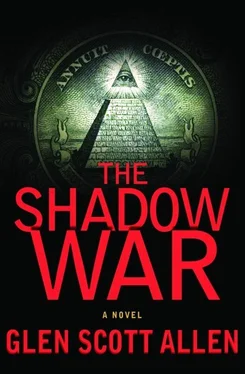Glen Allen - The shadow war
Здесь есть возможность читать онлайн «Glen Allen - The shadow war» весь текст электронной книги совершенно бесплатно (целиком полную версию без сокращений). В некоторых случаях можно слушать аудио, скачать через торрент в формате fb2 и присутствует краткое содержание. Жанр: Триллер, на английском языке. Описание произведения, (предисловие) а так же отзывы посетителей доступны на портале библиотеки ЛибКат.
- Название:The shadow war
- Автор:
- Жанр:
- Год:неизвестен
- ISBN:нет данных
- Рейтинг книги:5 / 5. Голосов: 1
-
Избранное:Добавить в избранное
- Отзывы:
-
Ваша оценка:
- 100
- 1
- 2
- 3
- 4
- 5
The shadow war: краткое содержание, описание и аннотация
Предлагаем к чтению аннотацию, описание, краткое содержание или предисловие (зависит от того, что написал сам автор книги «The shadow war»). Если вы не нашли необходимую информацию о книге — напишите в комментариях, мы постараемся отыскать её.
The shadow war — читать онлайн бесплатно полную книгу (весь текст) целиком
Ниже представлен текст книги, разбитый по страницам. Система сохранения места последней прочитанной страницы, позволяет с удобством читать онлайн бесплатно книгу «The shadow war», без необходимости каждый раз заново искать на чём Вы остановились. Поставьте закладку, и сможете в любой момент перейти на страницу, на которой закончили чтение.
Интервал:
Закладка:
"Then they're instincts I didn't know I had," said Benjamin, sitting on the bed. "And you haven't answered my other questions."
Wolfe waved the yellow paper at him.
"I think this may answer your questions. And I have a feeling you do know what it means, or it wouldn't have been in the Ginsburg book, a book Fletcher knew you would want to examine."
"But why not simply tell me when I arrived? Why put it in code?"
"Perhaps he had a premonition he might not be able to tell you in person," Wolfe said heavily. "Here, take another look at it."
Benjamin took the paper and studied it again.
"Well," he began tentatively, "offhand I'd say it looks like Franklin's pyramid code. Perhaps it's a coincidence…"
"To hell with coincidence," insisted Wolfe, "just tell me what you're thinking."
"You know what a pigpen code is?"
"Yes," said Wolfe. "As does every Boy Scout. It's the code the Masons used for some of their documents." Wolfe shuffled through papers on his nightstand, found something to write on and a pen, spoke as he drew on the paper. "You make two simple tic-tac-toe grids and two Xs, then distribute the letters of the alphabet across them, and then use symbols that represent the position of the letter in its grid. Like this, correct?" He showed Benjamin the sketch he'd made.
"So for instance 'Samuel' would be rendered as…" Again he drew on the paper. "This."
"Yes," said Benjamin, "that's the basic code."
"But," Wolfe objected, "I don't see any of those kinds of symbols there. It's all these little pyramids."
"Well," said Benjamin, "the pigpen code actually predates the Masons. There's even a record of a seventeenth-century gravestone in England, in Cheshire-one Thomas Brierley-with that code carved into it. Franklin felt the code was compromised by its very popularity. He thought he could do better. And he was a printer, after all, used to playing with letters and texts. He'd been experimenting with simple Caesar substitution codes for years; you know, where you simply shift letters so many places to the right or left?" Wolfe nodded. "But then that interest collided with one of his other manias, which was for pyramids. The Masons were quite mad about pyramids. They thought their 'perfect symmetry' held some ancient wisdom."
Benjamin lifted up the paper again. "So Franklin decided to combine the two codes, to construct a tabula recta -you know, Blaise de Vigenere's alphabet grids?" Wolfe nodded impatiently, and Benjamin hurried on. "But with pyramids rather than grids. Here."
Benjamin took the notepad from Wolfe and made his own sketch.
"So. If you construct a pyramid of small triangles, you get something like this."
Wolfe looked down at the sketch. "But there's only twenty-five triangles, no room in it for Z," he protested.
"Wait, I'll get to that. Of course, if the code is always the same, with the same letters in each triangle, then it isn't a very good code, is it. So there's a first key that tells the recipient which letter to put in the top triangle. Then, once you have the letters distributed in this pyramid of triangles, you assign a two-digit number to each letter. The first digit is the row, the second digit is the triangle within the row. So in this pyramid the A becomes 11, B becomes 21, C becomes 22, and so on. And whatever the missing letter is, like Z in this instance, becomes-"
"Zero?"
"Exactly." Benjamin placed the small yellow paper with TEACUP at the top next to the notepad. "But remember the first symbol here, the little triangle with a B in it? Well, that must be Jeremy's first key, which means the letter to place at the top of the pyramid is a B, so…" He rapidly drew another pyramid and began filling it in with letters. When he was finished he leaned back and pointed with the pen.
"Then 58 is fifth row, eighth triangle, which is Y, and the rest…" He worked silently for a minute. "There," he said finally, leaning back in the chair.
Wolfe looked down at what he'd written.
"Y-L-U-H-E-F-C-H?" Wolfe frowned. "Well, that may be a code, but it certainly isn't easy to remember. He would have had to go through this operation every time he wanted to enter his password. And what about this symbol at the end?" He touched the inverted triangle with the little dot in the upper right-hand corner.
"Ah," said Benjamin. " That's what put me on this track. The traditional Masonic code couldn't handle numbers, so Franklin created another pyramid of triangles just for numbers, like this." Again Benjamin worked at the notepad.
"Then he used the dots from the traditional pigpen code, rotating the dots around the corners and midpoints of the triangles, so you get this." Benjamin jotted on the pad.
"And as with the alphabet pyramid, zero would simply be an empty triangle."
"But why use any numbers here at all?" Wolfe asked. "Why not just a word or phrase?"
Benjamin smiled. "Franklin did use it for numbers with the older Masonic code. But with his own pyramid code, it took on a different function: the function of the second or shifting key in a Caesar substitution code."
"To shift letters so many places to the right?"
"Well, to shift the letters so many triangles ahead in the tabula recta pyramid. This symbol at the end of Jeremy's code would decode as a six. So if we go back to the pyramid and add six places to these letters we get…" He worked on the notepad for a moment. When he finished he sat back, grunted.
"What?" Wolfe leaned down closely over his shoulder. The converted message was written at the bottom of the page.
F-R-B-N-K-L-I-N
"Not much better," said Wolfe. He laughed. "I'm afraid you don't quite have this-"
"Of course!" Benjamin erased the B and wrote in an A. Now the line read:
"Jeremy was new to all this," Benjamin explained. "He forgot he'd shifted the A to the zero triangle, which isn't in the pyramid proper. Franklin had a special notation in those cases, but I guess Jeremy didn't know that, and…"
"Yes, yes, very interesting," said Wolfe, taking the paper from Benjamin. "Well, I suggest we don't wait until morning. Let's go and try this on Fletcher's computer right now."
Benjamin nodded, but as Wolfe retrieved his shoes and put them on, then moved to the door, Benjamin hadn't yet risen from the bed.
"Benjamin?" Wolfe prodded.
"It's just strange," he said.
"That someone as precise as Dr. Fletcher would make such a mistake?"
"No, not that. It's just very odd that Jeremy would choose this code, from all possible codes."
"Think where you are, Benjamin," Wolfe answered. "There's a cryptologist here, a Dr. Karl Bennett, one of the best in the field. I'm sure Fletcher was resourceful enough to seek him out and find out whatever he needed to know about codes."
"Perhaps." Benjamin shook his head. "But it's still strange. Franklin scholars had discovered these numbered codes in his correspondence and some of his business papers, and they'd assumed it was based on the Masonic code. But they'd never been able to decipher it before, until a particular letter was unearthed just last year."
"And who unearthed it?" Wolfe asked.
Benjamin looked up at him. "I did."
"What?"
"I wrote a paper about it. That discovery was responsible for my appointment at the Library of Congress."
"So in other words," said Wolfe, remaining in the doorway, "Fletcher knew that quite probably the only person who would be able to recognize this and decode it would be one Benjamin Franklin Wainwright."
Benjamin looked up at him, not quite comprehending.
"Isn't it obvious, Benjamin?" He smiled broadly. "He didn't leave this for himself. He knew the password. He left it for you."
Wolfe came over to the chair, put his hand on Benjamin's shoulder.
Читать дальшеИнтервал:
Закладка:
Похожие книги на «The shadow war»
Представляем Вашему вниманию похожие книги на «The shadow war» списком для выбора. Мы отобрали схожую по названию и смыслу литературу в надежде предоставить читателям больше вариантов отыскать новые, интересные, ещё непрочитанные произведения.
Обсуждение, отзывы о книге «The shadow war» и просто собственные мнения читателей. Оставьте ваши комментарии, напишите, что Вы думаете о произведении, его смысле или главных героях. Укажите что конкретно понравилось, а что нет, и почему Вы так считаете.












